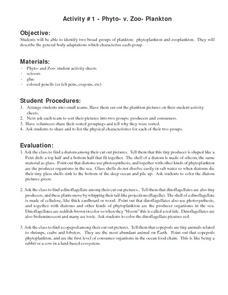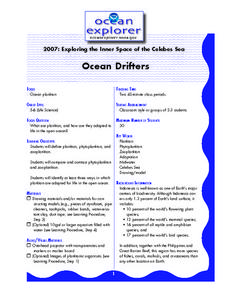American Museum of Natural History
What is Marine Biology?
A marine environment covers the majority of the earth but is arguably the least understood. Teach young scientists about the characteristics of oceans and ocean species using an interactive online lesson. The in-person or remote learning...
DiscoverE
Build a Plankton Net
Give household materials new life by turning them into a plankton net. Scholars design and build a net to collect and filter plankton from water. They test out their creations by using glitter to represent plankton. The nets need to...
Ask a Biologist
It’s a Plankton Eat Plankton World
For as small as they are, plankton sure play an enormous role in maintaining marine ecosystems. Dive into an investigation of these tiny organisms with a hands-on life science activity in which children cut out pictures of sea animals...
NOAA
Plankton
Dive into the world of plankton. The 17th installment of a 23-part NOAA Enrichment in Marine sciences and Oceanography (NEMO) program introduces different types of plankton. Young scientists then use what they have learned to classify...
American Museum of Natural History
What do You Know About Marine Biology
Show me what you know about the sea. Learners answer 10 questions about marine biology. The questions range from what evidence points to the origin of life to the biggest threat to oceans.
Consortium for Ocean Science Exploration and Engagement (COSEE)
Plankton to Penguins: Antarctic Food Web
A well-written lesson plan, second in a series of four, gets high schoolers exploring how the Antarctic food web is impacted by climate change and the associated melting of polar ice sheets. It begins with a PowerPoint presentation about...
University of Southern California
What Lives In The Ocean?
One of the most diverse environments on Earth is the ocean. Young scientists explore the living things found in the ocean during an exciting seven-lesson unit. Their study includes organisms from plankton to invertebrates and vertebrates...
University of California
Plankton
Plankton: so much more than just a SpongeBob character. Three different activities have kids looking at both phytoplankton and zooplankton in pictures, as well as collecting their own samples (depending on your access to a saltwater...
Curated OER
Phyto- v. Zoo- Plankton
Students identify two broad groups of plankton: phytoplankton and zoo plankton. They describe the general body adaptations which characterize each group. They discuss and write about what it would be like to be carried around by the...
Curated OER
What is Coral?
Students discuss what they know about coral reefs and are introduced to the importance of preserving coral reefs. In this coral reef lesson plan, students make connections between coral ecology in the classroom and in the real...
Polar Trec
Plankton Parents
Plankton are so abundant in the ocean they outweigh all of the animals in the sea. In this three day activity, groups discuss and become familiar with plankton, capture females, and look for egg production on day three.
Curated OER
Plankton
Learners explore the attributes of plankton. In this plankton lesson, students read This is the Sea That Feeds Us and discuss food chains. Learners discover the differences between phytoplankton and zooplankton as they examine the...
Curated OER
Plankton
Young scholars research phytoplankton and zooplankton. In this food chain lesson, students read This is the Sea That Feeds Us and discuss plankton, food chains, and webs. Young scholars define phytoplankton and compare them to land...
Curated OER
Feeding in the Flow
The National Oceanic and Atmospheric Administration (NOAA) has developed a tremendous library of ocean-themed lessons that can be used in a variety of science settings. "Feeding in the Flow" is one of those activities; Its focus is on...
Curated OER
Marine Fisheries Management
Almost 200 slides make this a vast collection! It is a quirky collection, titled "Marine Fisheries Management," but having little to do with that occupation. What you will find are two-toned blue backgrounds with no pictures, but a few...
Curated OER
Ocean World
In this components of the ocean worksheet, students answer 20 questions about various species in the ocean such as plankton, different types of whales, sharks, and herring. Students also answer questions about the volume of water in the...
Curated OER
Ocean Drifters
Students define terms, and identify three ways in which plankton are adapted for life in the open ocean. In this ocean drift lesson students design a planktonic organism.
Curated OER
Pond Water
Students explore a creek environment. They make observations, identify the living and nonliving factors in the environment and collect a plankton sample to take back to the classroom. In addition, they look at plankton under a microscope.
Curated OER
Great Blobs of Jelly!
Students explain how zoo-plankton have an impact on the global process. In this ocean zoo-plankton lesson students calculate carbon flux and plankton densities.
Curated OER
Make and Use a Plankton Net
Students make simple plankton nets and use them to collect and identify common forms of plankton. They identify and interpret plankton, as seen under a microscope, whether there was more zooplankton or phytoplankton. Finally, students...
Curated OER
Staying Up
Young scholars will explain the Archimedes's Principle. For this lesson on plankton, students will describe three factors that can affect the buoyancy of plankton. This lesson contains extensive background information, extensions, and...
Curated OER
Climate Analysis Using Planktonic Foraminifera
Students manipulate scientific data, plot the data and then interpret their results. They should recognize that the climate likely continue to change in the future. This activity ties in well with a discussion on current climate change.
Curated OER
What is an Estuary?
Students define the terms estuary and watershed. They conduct an experiment to determine the density differences between fresh and saltwater. They examine the salinity distribution of the Peconic Bay Estuary.
ARKive
Dinner at the Reef
Fine dining can happen anywhere, even in the coral reefs. Budding environmentalists explore marine food chains, predator-prey relationships and the importance of a balanced ecosystem. These important concepts are facilitated through a...

























